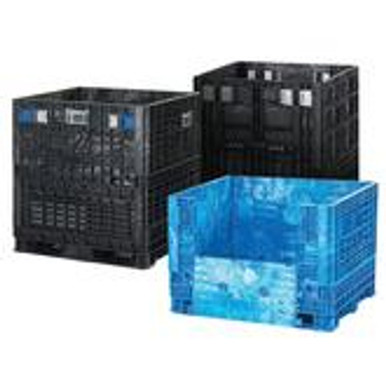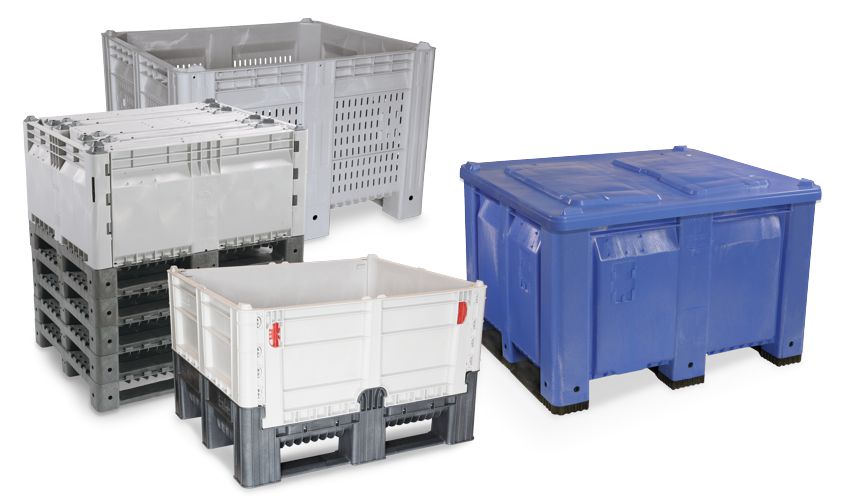Why Bulk Containers Are Vital for Sustainable and Cost-Effective Transportation
Mass containers play an essential role in modern logistics. They facilitate the efficient motion of big quantities of products, thereby enhancing transport processes. This method not only reduces expenses yet likewise decreases ecological impact through reduced emissions and waste generation. As industries look for more sustainable methods, the fostering of mass containers is becoming significantly significant. What effects does this change hold for future logistics and supply chain management?

The Benefits of Making Use Of Bulk Containers in Logistics
Bulk containers revolutionize logistics by boosting effectiveness and sustainability. These containers permit for the transport of large quantities of products in a solitary journey, substantially reducing the number of trips required. This not only streamlines procedures yet additionally lessens labor expenses connected with handling, packing, and dumping. On top of that, mass containers are designed to maximize space utilization within transportation lorries, making sure that more products can be shipped at the same time.
The standardization of mass containers also simplifies the logistics procedure. With consistent dimensions, they can be quickly piled and kept, leading to enhanced stockroom administration. Additionally, mass containers commonly feature sturdy materials that safeguard components from damage throughout transit, therefore lowering product loss and increasing overall integrity. Because of this, businesses can experience boosted supply chain performance, eventually resulting in increased profitability and client contentment. This mix of factors makes mass containers an essential asset in modern-day logistics.
Ecological Effect: Reducing Waste and Carbon Footprint
As industries significantly prioritize sustainability, the adoption of bulk containers has become a vital strategy for reducing waste and lowering carbon impacts. These containers minimize using packaging products, such as boxes and plastic, therefore notably decreasing total waste generation. By consolidating deliveries, mass containers boost transportation effectiveness, permitting even more products to be moved per trip. This reduction in journeys straight associates with lower greenhouse gas discharges, adding to a smaller sized carbon footprint.
Mass containers can usually be reused or recycled, additionally alleviating ecological effect. The resilience of these containers assurances they can withstand numerous transport cycles, decreasing the demand for single-use alternatives. used collapsible containers. By simplifying logistics and promoting efficient resource use, bulk containers not only sustain lasting methods however also encourage markets to line up with worldwide environmental objectives. Eventually, their application reflects a dedication to environmental stewardship and responsible source administration
Cost Cost Savings: How Bulk Containers Lower Transportation Costs
While lots of companies seek ways to boost their bottom line, the use of bulk containers presents a significant chance for decreasing transportation costs. Mass containers make the most of the volume of goods delivered, enabling services to ship bigger amounts at once. This effectiveness reduces the number of journeys required, directly lowering gas prices and minimizing labor expenses connected with loading and unloading.
Additionally, bulk containers usually feature structured styles that optimize room use within transport vehicles. This indicates less vacant spaces, causing much more effective use of available capability. In addition, the longevity of mass containers can decrease the risk of product damage during transit, lowering losses and guaranteeing that more products get here intact.
Enhancing Supply Chain Performance With Mass Storage Space Solutions
Bulk storage solutions play a necessary function in boosting supply chain efficiency by optimizing stock management. By consolidating items right into less, larger containers, businesses can greatly minimize managing expenses connected with frequent transfers and processing. This structured strategy enables better monitoring and monitoring of stock, ultimately bring about improved operational performance.
Structured Supply Administration
Effective inventory administration is important for optimizing supply chain operations, especially when companies adopt bulk storage space solutions. These services allow services to keep greater stock degrees while lessening the regularity of replenishment. By consolidating products right into mass containers, companies can simplify their inventory procedures, minimizing the intricacy related to tracking several smaller plans. This approach helps with precise supply matters and boosts projecting accuracy, enabling for even more enlightened decision-making. Furthermore, bulk storage options streamline storage facility company, making it less complicated to locate and gain access to products when required. Therefore, organizations can achieve an extra efficient inventory turn over price, eventually improving total supply chain efficiency and decreasing the chance of stockouts or overstock situations.

Minimized Handling Expenses
The application of mass storage solutions not just streamlines supply management however likewise substantially decreases taking care of prices across the supply chain. By combining materials into bulk containers, business minimize the requirement for constant handling and transfer between various storage and transportation systems. This approach reduces labor costs connected with loading, unloading, and moving smaller sized bundles. In addition, mass storage space decreases the regularity of shipments, causing lower index transport prices and lowered gas usage. Therefore, businesses can enhance their logistics operations, permitting for a much more efficient allotment of sources. Inevitably, lowered dealing with costs add to improved overall supply chain performance, cultivating an environment that supports both sustainability and financial practicality.

Convenience of Mass Containers Throughout Different Industries
Many sectors have distinct requirements for transportation and storage, bulk containers have actually arised as a versatile service that meets a broad array of needs. These containers, varying from huge containers to specialized tanks, can fit varied materials, including granules, powders, and liquids. In the agricultural market, mass containers promote the transport of fertilizers and grains, while the food and beverage industry utilizes them for components and completed items. The chemical market depends on bulk containers for safely delivering dangerous materials, guaranteeing compliance with safety and security guidelines. In addition, building companies gain from bulk containers for moving accumulations and other products. Their adaptability reaches different settings of transportation, including ships, vehicles, and trains, enhancing logistical efficiency. This adaptability not just improves operations throughout different fields yet also promotes sustainability by reducing packaging waste and optimizing room in transit. Mass containers play an essential duty in contemporary supply chain monitoring.
Future Trends in Mass Container Use and Sustainability
The future of bulk container usage is increasingly shaped by innovative products development that enhances sustainability. Furthermore, automation in logistics assures to enhance procedures, reducing waste and improving effectiveness. Embracing round economy practices will certainly better revolutionize how bulk containers are made, used, and reused, cultivating a much more lasting transportation landscape.
Ingenious Materials Growth
As industries progressively focus on sustainability, cutting-edge products growth wholesale containers becomes a considerable factor in improving environment-friendly transportation remedies. Producers and researchers are discovering biodegradable plastics, recycled compounds, and lightweight steels to decrease environmental effect. These products not only reduce waste yet additionally improve gas efficiency by lowering the general weight of containers. Additionally, improvements in clever products, which can adapt to varying problems, enhance the durability and performance of mass containers. The combination of these innovative materials aligns with circular economic climate principles, promoting reuse and recycling. As the need for sustainable methods grows, the development of such products will certainly play an important duty fit the future of bulk container use in logistics and transport.
Automation in Logistics
Substantial improvements in automation are poised to change logistics and the use of bulk containers, boosting sustainability in transport. Automated systems, consisting of drones and independent automobiles, are simplifying the movement of bulk containers, decreasing the dependence on traditional fuel-powered transport. These technologies maximize directing and loading processes, enhancing and decreasing empty miles gas effectiveness. Additionally, automated inventory monitoring systems boost monitoring and surveillance of mass containers, making sure much better resource appropriation and lowered waste. The integration of the Internet of Things (IoT) permits real-time information analysis, allowing positive decision-making that straightens with sustainability objectives. As automation proceeds to advance, it is expected to drive additionally innovations in mass container use, ultimately sustaining more lasting logistics techniques and decreasing the environmental effect of transportation.
Round Economic Situation Practices
Improvements in automation are setting the stage for a much more incorporated technique to circular economy practices in the domain name of bulk container use. As industries significantly accept sustainability, mass containers are being developed for long life and reusability. This shift not just minimizes waste however additionally improves resource performance. Companies are embracing approaches such as closed-loop systems, where used containers are gathered, reconditioned, and reintroduced right into the supply chain. In addition, wise innovations track container life process, helping with far better management and minimizing ecological impact. The partnership in between suppliers, logistics providers, and end-users is vital in developing standards for sustainable container use. refurbished bulk containers. Future trends suggest an expanding focus on materials that are biodegradable and recyclable, further strengthening the circular economic climate's concepts wholesale transportation

Often Asked Inquiries
What Materials Are Mass Containers Typically Made From?
Mass containers are commonly created from resilient products such as high-density polyethylene, cardboard, steel, and aluminum. These materials supply flexibility, stamina, and protection, making them ideal for delivering different items in various sectors effectively.
Exactly how Do I Select the Right Dimension Mass Container?
Selecting the appropriate dimension mass container involves reviewing the quantity of materials to be transferred, taking into consideration dealing with devices compatibility, and evaluating storage space demands. Correct dimension assurances efficiency in transportation and decreases waste throughout delivery.
Are Bulk Containers Reusable or Recyclable?
Bulk containers are often reusable, created for multiple journeys, boosting sustainability. Many can additionally be reused, relying on the products utilized. Choosing recyclable options better sustains ecological objectives and minimizes waste in transportation practices.
What Safety And Security Rules Put On Bulk Container Transportation?
Security regulations for mass container transportation include conformity with the my link Department of Transport standards, proper labeling of hazardous products, architectural stability evaluations, and adherence to weight limits to guarantee secure handling and protect against crashes during transit.
Just How Can Businesses Change to Using Bulk Containers Properly?
Businesses can transform to bulk containers by reviewing present logistics, training team on handling, spending in appropriate equipment, view it optimizing supply administration, and collaborating with suppliers to assure compatibility and effectiveness throughout the supply chain.
As sectors significantly prioritize sustainability, the fostering of bulk containers has actually emerged as a crucial approach for decreasing waste and lowering carbon impacts. By settling materials right into bulk containers, business can streamline their supply processes, decreasing the intricacy linked with tracking multiple smaller bundles. As sectors increasingly prioritize sustainability, ingenious products development in mass containers emerges as a substantial variable in enhancing green transportation services. Automated systems, including drones and self-governing automobiles, are simplifying the movement of bulk containers, decreasing the reliance on typical fuel-powered transport. In addition, automated inventory management systems improve monitoring and surveillance of bulk containers, ensuring far better source allotment and lowered waste.